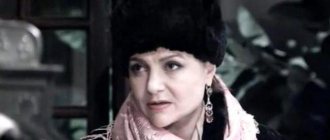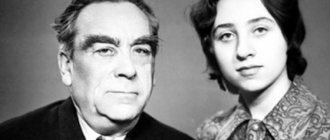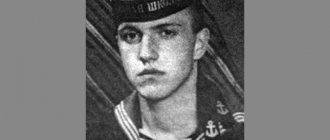Name: Alexander Demyanenko Height: 169 cm According to the zodiac sign: Gemini According to the eastern horoscope: Ox In what year was he born: 1937 In what year did he die: 1999 Why did he die: heart failure
This artist experienced the ninth wave of incredible fame. He had to get used to the difficult life of a public idol, and then a long period of complete absence of roles. Together with the director, he created a new image in cinema - romantic, simple-minded, intelligent.
The name of this artist is Alexander Demyanenko. But for millions of viewers he will forever remain Shurik - after the name of the hero of his most striking image.
Wikipedia gives information about Alexander Demyanenko briefly and dryly. A long list of many roles can be viewed there, but to understand the personality of this actor, one Wiki page is not enough.
Childhood and youth
Demyanenko Alexander Sergeevich was born in the Ural city of Sverdlovsk into an intelligent creative family. Date of birth: May 30, 1937. He is Russian by nationality. Mom, Galina Vasilievna Demyanenko, worked as an accountant. After the birth of her son, very soon, she was left alone with little Sasha, because her father left the family.
Father, Sergei Petrovich, was a creative, enthusiastic person. A graduate of GITIS, an actor in the famous theatrical propaganda group “Blue Blouse”, which performed in the 20s of the last century, he served in the Sverdlovsk Opera House and taught acting at the Philharmonic. He had many fans, and he left one of them when his son was still just a baby.
Despite this, Alexander Demyanenko believed that he had a happy childhood and family.
After living with another woman for several years and having two daughters with her, Sergei Petrovich realized that he still loved his first wife very much and did everything to return to her. Galina Vasilievna forgave her husband, the family was reunited and two more girls appeared in it.
The artist’s children maintained friendly relations. A significant role in this was played by adults, who reconciled and created a normal, family environment around the children.
Alexander Demyanenko's half-brother, Vladimir Sergeevich, also devoted himself to creativity, became a pianist and People's Artist of the RSFSR, worked with Yu.A. Bashmet.
The father greatly influenced his son’s hobbies and studied with him. Young Sasha Demyanenko took his first stage steps as a child, in an amateur theater at the Sverdlovsk Palace of Culture under the direction of his father. The boy also attended a music school and learned to play the piano. They say that Alexander Demyanenko sang beautifully in a low, velvety voice. Unfortunately, the audience never heard this...
Alexander often attended premieres of performances; his father tried to convey to his son his love of art. He succeeded. Since childhood, the boy dreamed of becoming an artist and acting on stage and in films.
Biography
Youth and admission to GITIS
Born on May 30, 1937 in Sverdlovsk. In 1954, after graduating from Sverdlovsk school No. 37 with in-depth study of the German language, he tried to enter the Moscow Art Theater (the admissions committee came to Sverdlovsk), but due to excitement he could not.
Then he successfully entered the Sverdlovsk Law Institute, but studied there for only six months, realizing that this profession was not suitable for him. A year later, together with friends, he went to Moscow, where he entered GITIS.
The parents received a telegram from their son: “ Victory!” Accepted into GITIS and Shchukinskoe. I'm staying at GITIS
" He graduated from GITIS in 1959.
He was not the best student. He studied well, but missed a lot of classes. Everything was forgiven to him, since Professor Joseph Raevsky loved him very much and believed in his success.
Already in his 2nd year at GITIS (workshop of Grigory Konsky), directors Alexander Alov and Vladimir Naumov invited him to play the role of Mitya in the film “Wind” - an optimistic drama that completed the “Komsomol” trilogy, begun with the films “Anxious Youth” and “Pavel Korchagin”. This work of his as an aspiring actor attracted the attention of both viewers and filmmakers. A new type of hero was born - a modest, intelligent young man performing a feat.
In 1959, he was invited to the Moscow Academic Theater named after Vladimir Mayakovsky, where he worked for 3 years, but the actor was increasingly drawn to cinema. He soon left Moscow and the Mayakovsky Theater and settled in Leningrad, where he lived and worked at the Lenfilm film studio until his death.
Family
- Father - Sergei Petrovich Demyanenko (03/20/1909, Yekaterinburg [5] - 2000, Yekaterinburg) - graduated from GITIS, actor, director of the opera class at the Sverdlovsk Conservatory, taught acting and organized city public holidays; after the birth of his son, he left the family and married a fan, who bore him a son and a daughter, and after 2 years he returned to his wife, who then gave birth to two daughters[5][6][7]. In Yekaterinburg he lived at the address st. Prostornaya, 146, apt. 108.
- Mother - Galina Vasilievna Demyanenko (Belkova) (1914[5] -?) - worked as an accountant.
- Half-brother (paternal)[5] - Vladimir Sergeevich Demyanenko (born 1941) - pianist, music worker, People's Artist of the RSFSR, headed the Sverdlovsk Philharmonic [5][8].
- Sisters - Nadezhda, Natalya, Tatyana.
Personal life
- The first wife is Marina Danilovna Sklyarova (04/01/1938 - 12/18/2017)[9]. She studied with him in the drama club, theater expert, screenwriter, collaborated with Leningrad television, published in periodicals. In the 1990s, she worked as a compiler and translator on the publication of works and personal archives of theologians and hierarchs of the Russian Orthodox Church, published in four volumes entitled “ The Chosen Vessel,” was published in Orthodox periodicals, wrote several collections of fairy tales and poems, received awards from the Russian Orthodox Church, and in 2004 published a collection of her poems, “Passion for St. Petersburg”[9][10]. She had several abortions[11].
- Second wife - Lyudmila Akimovna Demyanenko (01/05/1940 - 06/20/2005)[12]. She met Alexander while being an assistant dubbing director at the Lenfilm film studio, where Demyanenko worked on dubbing[13]. Subsequently, she was a dubbing director at Lenfilm, in 1994-2005 - at (since 2002 - Nevafilm)[14][15].
- Stepdaughter - actress Anzhelika Nevolina (born April 2, 1962).
- Son-in-law - actor Alexey Zubarev (born March 30, 1954)[16].
In Leningrad/St. Petersburg he lived on Omskaya Street, in house No. 10 (apt. 17); Bronnitskaya street, at number 33; on Tambasova Street, in house No. 30, bldg. 2; on Mayakovsky Street, house number 15.
Moving to Leningrad
Since 1962, he left the Mayakovsky Theater and moved from Moscow to Leningrad. Firstly, he had already begun to participate in filming at Lenfilm, and secondly, he had nowhere to live in Moscow, but in Leningrad they gave him an apartment. In addition, the actor simply did not like Moscow. Having arrived in Leningrad back in 1961, he remained here until the end of his life. He was invited to Moscow theaters many times, but he no longer wanted to return to Moscow.
Film roles
The actor made his film debut with a role that attracted the attention of both viewers and directors to him - in the film “Wind” by Alexander Alov and Vladimir Naumov, released in 1958. In 1959, the actor played a cameo role as a photographer in Vasily Ordynsky’s melodrama “Peers” (not listed in the credits). The actor also starred in the film “Peace to the Enterer” (1961), directed by Alov and Naumov, thanks to which he was recognized abroad - the film was awarded several awards at the Venice Film Festival.
At Lenfilm he starred in Vladimir Vengerov’s film story “Empty Flight” (1962), where he played a young journalist from the central newspaper Sirotkin, who uncovers fraud; in Nikolai Rozantsev’s detective story “State Criminal” - investigator for especially important cases Andrei Polikanov, investigating the case of a war criminal. Thus, role after role, the actor gained popularity among the audience.
At the Sverdlovsk Film Studio he starred in the film “Gloomy River” in the role of clerk Ilya Sokhatykh.
Comedies by Leonid Gaidai
In the mid-1960s, Leonid Gaidai began filming a comedy. The script was called “Frivolous Stories”, and the main character was student Vladik Arkov. For the role of the main character, Gaidai tried 40 candidates, among whom were Vitaly Solomin, Alexander Lenkov, Evgeny Zharikov and many others. As a result, Demyanenko, who worked in Leningrad, came up. He was a hot brunette, but in the film they decided to make him blond. The actor himself, in 1998, in a conversation with Verka Serduchka in the program “SV-show”, noted the following about this: [17]
I must say that it was quite unpleasant. At that time, then, there were no such wonderful dyes as there are now. That's why they painted me with blankite. You know, it's something like a mixture of lime and something. This is a terrible procedure. I was a brunette at that time, so hot. My hair (they smeared it all over my head) was burned with this blanket, and, to hell with it, all the skin on my poor head. So this impression remains.
And the actor’s widow Lyudmila Akimovna later recalled:[18]
They painted him mercilessly, ugly, until his skin blistered. The colors were terrible back then. It’s good that Sasha’s hair is thick and, despite all the experiments, he has not gone bald.
The role of Shurik brought success to the actor. Two years later, Gaidai filmed a continuation of the adventures of the hero beloved by the audience - “Prisoner of the Caucasus, or New Adventures of Shurik.” And in 1973 the comedy “Ivan Vasilyevich Changes His Profession” was released.
Television roles
Directors soon stopped offering the actor interesting roles. Television saved him from this, where he performed in the most unexpected images and even played one-man shows, including “Idol” by Dürrenmatt, “Enchanted Night” by Slavomir Mrozek, “To the Very Essence” and “Seven Crosses in a Notebook” by Georges Simenon. Demyanenko managed to create memorable works in several films from directors who were interested in the actor’s extraordinary dramatic talent [ source not specified 1735 days
], - in “The Gloomy River” and in “The Singing Teacher” by Nahum Birman. In addition, the actor worked a lot in the theater, acted on television, and voiced cartoons.
In 1968, on Leningrad television, he tried himself as a film director, directing the short film “Holy Lie.”
In the mid-1990s, he starred in the first Russian sitcom “Strawberry”.
Voice acting
He was one of the leading dubbing actors - Donatas Banionis spoke in his voice, as well as foreign actors Omar Sharif, Jean-Paul Belmondo, Hugo Tognazzi, Robert De Niro, Steve Buscemi, Jon Voight, Arnold Schwarzenegger, Orlando Bloom, Tony Curtis and many others [19][20].
Roles in the theater
In the theater, he performed more in enterprises. From 1984 until his last days he was an artist at the St. Petersburg Comedy Theater named after N.P. Akimov, where he played several prominent roles. Recent works on stage - the play “Don Pedro” (dir.: T. Kazakova) played on the stage of the theater together with Mikhail Svetin, also worked in the “Comedian’s Shelter” and the Moscow Academic Theater. Vl. Mayakovsky.
In the mid-1990s, the Comedy Theater named after N.P. Akimov changed its chief director - Tatyana Kazakova came, who had her own plans, and for some reason the actor was not included in them. Then he moved to the St. Petersburg theater "Comedian's Shelter", where he immediately played in two performances, which became an event in the theatrical life of St. Petersburg [ source not specified 1735 days
]. In recent years, the actor has successfully continued to play on the stage of this theater.
In 1991 he was awarded the title of People's Artist of the RSFSR[4].
Death
In the summer of 1999 there was intense heat. The actor, at the insistence of the doctors, was preparing for a coronary angiography, which could no longer be delayed. The operation was scheduled for September 1, 1999, when all the doctors planned to return from vacation and the heat should have stopped, but he did not live to see it 10 days[21].
He died at the age of 63 on August 22, 1999 in St. Petersburg in a hospital.
The diagnosis is pulmonary edema caused by coronary heart disease.
On August 26, 1999, hundreds of people came to the actor’s funeral. His father, Sergei Petrovich, due to health reasons and old age, was unable to come to his son’s funeral.
He was buried at the Serafimovskoye cemetery (section 13) in St. Petersburg.
Tombstones of A. S. Demyanenko and his wife at the Serafimovskoye cemetery in St. Petersburg.
Actor's studies
The first attempt to enter the theater was unsuccessful. It would seem that the circumstances could not have been better: Alexander graduated from school, and the selection committee from the Moscow Art Theater came to Sverdlovsk. But the young man was so worried that he could not control his voice and did not pass the selection.
Alexander was upset, even tried to argue with fate and entered the Sverdlovsk State University at the Faculty of Law. He studied there for a short time. The very next summer, in the company of bosom friends, he headed to Moscow to fulfill his old dream.
At creative exams, Demyanenko recited Ya. Smelyakov’s poem “The Good Girl Lida.” This time he passed the competition to two educational institutions at once. “I’m staying at GITIS,” the future student sent a telegram home.
Studying was not easy for Alexander. It seemed that everything was fine. Either he could break away from classes and fly home, to where he was born, where his family and friends are, or to Leningrad, to his beloved girl - former classmate Marina Sklyarova. In addition, he began acting in films early. And this is a serious burden for a student.
In fairness, it should be noted that the strict teachers of GITIS saw a talented actor in the young student and made some concessions: for example, he was strictly required to attend only acting classes without passes.
Filmography
Alexander Demyanenko played his first film role as a second-year student. This was the role of Mitya in the film “Wind” by A. Alog and V. Naumov. Alexander needed to create the image of a romantic and selfless young man, capable of heroic deeds, a Komsomol member.
The film completed the “Komsomol” trilogy, following the first two films: “Anxious Youth” and “Pavel Korchagin”.
In 1959, a graduate of a theater university, actor A. Demyanenko entered the service at the Moscow Theater. V. Mayakovsky.
His first steps in cinema immediately became iconic - he played in the films “It All Starts with the Road,” “Dima Gorin’s Career” and “Peace to the Enterer.”
If before this the main character of films was quite predictable in his readiness for achievements, now the directors and the actor have created a new image of a modern, at that time, hero. Intelligent, smart, well-mannered, this guy probably went to literary meetings at the Polytechnic, read samizdat, and wore fashionable trousers. At the same time, the hero Demyanenko was ready for actions that required courage and willpower.
Alexander really matched his acting image and the role stuck with him.
After serving in the Moscow theater for three years, Alexander Sergeevich decides to move to the northern capital. He was invited to Lenfilm and offered his own apartment. In addition, his love from school, Marina Sklyarova, lived in Leningrad.
The first role, now as a Lenfilm actor, in the film “Empty Flight” brought Alexander Demyanenko serious success and a prize at the Moscow Film Festival.
But the film of his life was the comedy about Shurik, filmed by Leonid Gaidai in 1964.
Initially, the main character was supposed to be called Edik or Vadik, and the film was to be called “Frivolous Stories.” But during the filming, as the director himself recalled, he saw himself in his youth in actor Alexander Demyanenko - eccentric, playful. So Edik became Shurik, and the name of the film came by itself.
Like his director, actor Demyanenko was not the life of the party. In life, these people did not like noisy communication and increased attention. This made them even more related. But Alexander Demyanenko did not develop a personal friendship with his colleagues in the staff - the cheerful trinity “Vitsin-Morgunov-Nikulin”: the difference in age and in the approach to issues of the profession affected.
On the one side. L. Gaidai is known as a demanding director, on the other hand, he gave his actors the freedom to improvise, this also applied to Demyanenko. The actor later said that he didn’t really have to get used to the role, to play, he was in many ways the same Shurik.
The only trouble that Alexander Sergeevich recalled was the need to lighten his hair. The actor was a sizzling brunette, and his character was blond. I had to endure hair lightening procedures that left blisters on my skin.
The comedy was released in 1965 and immediately stepped into the history of Russian cinema, breaking all possible records: it was watched by more than 69 million people, i.e. a quarter of the country's population!
Inspired by the success, and “at the numerous requests of the working people,” L. Gaidai films a continuation of the intellectual’s adventures, now in the mountains, and calls the film “Caucasian Captive or Shurik’s New Adventures.” This film was watched by more than 76 million viewers!
Fame simply fell on the actors who starred in the film. It became impossible to live a normal life, to go outside, to do ordinary everyday things. As soon as the artists crossed the threshold of their home, people immediately surrounded them, calling them somewhere, inviting them, asking for an autograph. Such love from the audience could be pleasant if it were not so intrusive, and sometimes even familiar. Alexander Sergeevich, wherever he appeared, was called “Shurik”, offered a drink, and considered it possible to behave like old friends, patting him on the shoulder.
Alexander became even more withdrawn; Since then, his favorite means of transportation was a car, inside of which he did not have to share space with other people.
When the last unofficial part of the trilogy about Shurik, “Ivan Vasilyevich Changes His Profession,” was released, Alexander Demyanenko was only thirty-five years old. It seemed that there were still many interesting and diverse roles ahead, because the actor did not have to prove his talent and skills. But it turned out differently. The actor's most striking role became his curse. The directors saw the young, ingenuous Shurik in an adult with his deep inner world, and did not invite Alexander Sergeevich to roles that corresponded to his age and attitude. Everyone explained it like this: “I will film about a doctor, and the audience will see Shurik.”
And yet the actor filmed and worked. He played serious roles in the films “Gloomy River”, “Green Van”, “Singing Teacher” and was upset that behind the image of Shurik, the audience did not notice other, very convincing, roles of the artist.
During his creative career, Alexander Sergeevich Demyanenko played roles in 113 films. Many of them make up the Golden Fund of Russian cinema.
Films starring actor A. Demyanenko:
- 1961 “Career of Dima Gorin”, “Adult Children”, “Peace to the Entering One”
- 1962 "Empty Flight"
- 1963 "Cain XVIII"
- 1963 “Employee of the Cheka”
- 1964 "State Criminal"
- 1965 “Operation “Y” and other adventures of Shurik”
- 1965 “How many years, how many winters!”
- 1966 “Prisoner of the Caucasus, or New Adventures of Shurik”
- 1969 “Casting to the Long Side”
- 1970 “My Good Dad”
- 1970 “At the Dacha”
- 1973 “Ivan Vasilyevich changes profession”
- 1973 "Smart Things"
- 1977 "Crane in the Sky"
- 1978 “They carried a chest of drawers through the streets...”
- 1982 “Seven crosses in a notebook”
- 1996 “Cafe “Strawberry””
- 1998 “Kept Woman”
Acting career of Alexander Demyanenko, filmography
The future favorite of the Soviet public began acting in films at the age of twenty-two, while still a second-year student at GITIS.
In the late fifties - early nineties, Alexander Demyanenko appeared in such remarkable films as “It All Starts with the Road”, “Evenings on a Farm near Dikanka”, “Adult Children”, “Career of Dima Gorin”, “Peace to the Entering One”, “Empty Flight”, “Cain XVIII” “Employee of the Cheka” and others. It is quite noteworthy that already during this period the actor began to often appear in films in the image of an open and slightly unlucky young man, distinguished, however, by his innate honesty and intelligence. After graduating from the institute, Alexander continued to act in films, and at the same time began to often appear on the theater stage. Some time later, at the invitation of one of the Leningrad studios, the actor moved to the city above the Neva. It was here, ironically, that he met Leonid Gaidai, who, according to one version, specially came to Leningrad from Moscow to watch the talented actor play. “The show” was successful, and very soon Alexander Demyanenko began starring in the film “Operation “Y” and other adventures of Shurik.”
The comedy was released in 1965 and immediately became the favorite film of millions of Soviet citizens. A few years later, the second part of the popular film appeared - “Prisoner of the Caucasus or Shurik’s New Adventures.” At this moment, Alexander Demyanenko finally established himself as a popular and successful film actor. Directors began to offer him new roles, but none of the films released between 1967 and 1973 became as popular as the films about the legendary Shurik. The artist in his creative path often crossed paths with such colleagues as Natalya Varley, Andrei Mironov,
At some point, the popularity of Alexander Demyanenko began to decline, but the situation was corrected by a new film by Leonid Gaidai. Returning again to the role of a decent, but slightly unlucky intellectual in the film “Ivan Vasilyevich Changes Profession,” Alexander Sergeevich again gained all-Union popularity.
After the release of the popular Soviet comedy, the actor often acted in films, but his subsequent roles did not bring him such popularity and fame as his roles in the legendary films of Gaidai.
In 1991, Alexander Demyanenko received the title of People's Artist of the RSFSR. However, this award to some extent marked the end of his colorful career. In the nineties, the actor again began to often play in the theater, and also work on scoring many foreign films. Thus, his voice can be heard in such Hollywood films as “Showgirls”, “Con Air”, “Enemy of the State”, “Armageddon”, “My Favorite Martian” and many others. In addition, the actor also participated in the dubbing of many Disney cartoons, including such famous films as “The Swan Princess,” “Hercules,” “Tarzan,” “Mulan” and others.
In memory of Alexander Demyanenko
Roles in the theater
In 1984, Alexander Demyanenko left television and joined the N.P. Akimov Comedy Theater on Nevsky Prospekt. But in 1990, director T. Kazakova came to the theater, becoming famous for the phrase: “We don’t need Shuriki!”
Alexander Sergeevich moved to the St. Petersburg “Comedian’s Shelter”, where he served until the very end. His participation in two performances of this theater: “Antigone” and “Vladimirskaya Square” became the highlight of the season. These were deep, characteristic roles, and according to the audience who saw the actor’s performance, he was worthy of any, even the greatest scene.
Unfortunately, at the end of his life, Alexander Demyanenko had to travel around the country with enterprises and creative meetings. In these meetings, the most difficult thing for the artist was to hear the familiar name of the screen character. “Do you want to see Shurik? Go to him. I’m not Shurik, I’m Alexander Demyanenko!” Sometimes the actor reacted sharply.
On February 11, 1991, a government decree was published on the assignment of Demyanenko A.S. title of People's Artist of the RSFSR.
Accountant Dmitry Gorin
"Career of Dima Gorin" (1961)
Photo: still from the film “Dima Gorin’s Career”
In 1961, Alexander Demyanenko received the main role in the film “Dima Gorin’s Career” directed by Frunze Dovlatyan and Lev Mirsky. There he played a young, promising accountant.
According to the plot of the film, Gorin does not make mistakes, is always attentive, diligent and tidy. At work he is known as an honest comrade, and his superiors are about to give him a promotion. Only one day, Gorin gets confused in the calculations and pays an extra three and a half thousand rubles to a client who came from a distant Siberian construction site, and to correct the mistake, he goes to Taiga.
The client returns the debt, but Gorin is in no hurry to leave: he falls in love with the installation foreman Galya Berezka, forgets about his career in the capital and gets a job on the construction of a high-voltage transmission line.
The director saw in Alexander Demyanenko an actor who could easily take on the role of a brave and decent person, capable of action. It was with this image that the viewer began to associate Demyanenko.
In 1961, the film “The Career of Dima Gorin” became the leader of the Soviet box office: it was watched by more than 20 million viewers.
Voice acting and dubbing
The actor was always invited to film studios to voice characters in foreign and animated films. But there were years when this work became almost the only one. Many people don’t even realize how many Hollywood heroes actually speak Russian in the voice of Shurik from “Prisoner of the Caucasus”...
Even in Soviet films, Alexander Demyanenko voiced many famous Baltic actors: Donatas Banionis, Juozas Budraitis, Regimantas Adomaitis.
The dubbing of foreign films began with Michael Denison in the film “The Importance of Being Earnest” while studying at GITIS. And then Omar Sharif, Jean-Paul Belmondo, Steve Buscemi, Robert De Niro and many others spoke in Demyanenko’s voice.
In the nineties, the actor worked on voicing characters in several animated films. In "Hercules" Zeus speaks in his voice, and in "Mulan" the Emperor of China speaks.
In total, Alexander Demyanenko voiced 7 cartoons. He also dubbed 31 films in Russian and 41 foreign films.
Alexander Demyanenko in cinema
The actor's first film works
Demyanenko made his screen debut in 1958, while he was still a 2nd year student at GITIS. He was invited by the famous Alov
and
Naumov
in his film about the civil war
“Wind”
.
His partners in the film were Elsa Lezhdey
(who later became famous for “The Experts”) and
Eduard Bredun
.
Edward, the husband of the charming Isolda Izvitskaya
, was by that time a most promising young actor, but, unfortunately, for various reasons, his film career never developed.
Tamara Loginova and Alexander Demyanenko.
“Wind” 1958 But let’s return to Demyanenko. In 1961, he had the opportunity to play the leading role. And in 2 films at once. In “Adult Children” by Villena Azarova
he got the role of the on-screen husband of
Liliana Aleshnikova
.
Liliana Aleshnikova and Alexander Demyanenko.
“Grown Children” 1961 And in the comedy “Dima Gorin’s Career”
Alexander played the title role.
An interesting moment happened during the filming of one of the episodes. According to the plot, the driver Sofron ( Vladimir Vysotsky
) pesters a girl Gala (
Tatyana Konyukhova
) in the cab of a truck. All this is seen through a small window located in the back of Dima Gorin. Upon arrival at the scene, the hero Demyanenko immediately attacks Vysotsky with his fists.
I must say that Vladimir Vysotsky was then an aspiring actor. But Demyanenko still could not bring himself to deliver a powerful hook to the future bard, required by the script. The episode was remembered by many filming participants; subsequent eyewitness accounts differed in detail.
In one version of the story, Demyanenko carried out 8 takes, and after each blow, like a real intellectual, he said “Sorry.”
.
But the director still wasn’t happy with something. Then Vysotsky could not stand it: “Stop apologizing.
Hit it hard – no more takes!” Only from the 9th blow (take) the episode was filmed.
Alexander Demyanenko and Vladimir Vysotsky.. “The Career of Dima Gorin” 1961.
In the early 60s, Alexander Demyanenko had several more successful roles. Moreover, he got mostly serious jobs: junior lieutenant in “The Entering World”
, journalist in
“Empty Flight”
, title role in
“Employee of the Cheka”
, investigator in
“State Criminal”
.
“State Criminal” 1964
It seemed that his role as a serious actor had developed. But then Leonid Gaidai
…
Comrade Shurik
In 1965, Leonid Gaidai conceived “Operation Y”
.
The legendary director had the greatest difficulties with the choice of the main character. About 50 people auditioned for the role of Vladik Arkov (that was the original name of the main character). Among the applicants there were many famous actors: Vitaly Solomin
,
Evgeny Zharikov
,
Alexander Lenkov
,
Alexander Zbruev
.
Even Evgeny Petrosyan
auditioned.
After some deliberation, the director approved Valery Nosik
. But, apparently, this choice did not suit him. It must be said that although Demyanenko had already played several good roles, he did not come into Leonid Iovich’s field of vision. The 60s were the heyday of Russian cinema; it was impossible to keep track of all the young stars.
Fortunately, someone nevertheless suggested that Gaidai watch “the guy from Dima Gorin.” The director called the Leningrad actor and realized that the main character had been found and his name would be Shurik. But, for the sake of the role, Alexander had to bleach his hair and turn from a brunette to a blonde. Well, Gaidai gave Valery Nosik the role of an unlucky student gambler, which he coped brilliantly with.
Vladimir Rautbart and Valery Nosik. “Operation “Y” and other adventures of Shurik” 1965
And Alexander Demyanenko, as they say, woke up famous after the premiere of the film. From that time until the end of his life, numerous fans associated the actor only with Shurik.
Moreover, the very next year viewers received, in modern terms, the sequel “Prisoner of the Caucasus, or Shurik’s New Adventures”
.
It is curious that the charming Natalya Varley
attracted the entire male part of the film crew except Alexander Demyanenko. He, having professionally played the episode with the beauty, immediately walked away.
Natalya Varley and Alexander Demyanenko.
“Prisoner of the Caucasus, or Shurik’s New Adventures” 1966 As Nina Grebeshkova
, the widow of the great director, at first it was assumed that Demyanenko was a flint.
How could it be otherwise, Crimea, the sea, the sun, Varley herself is nearby, but he doesn’t even care. But still, nothing human was alien to “Shurik”. Although in secret, it turns out that the actor was flirting with one of the pretty makeup artists during filming. Natalya Varley and Alexander Demyanenko.
“Prisoner of the Caucasus, or New Adventures of Shurik” 1966. Viewers had to wait for the third part of the “franchise with Shurik”. Only in 1973, a new comedy by Gaidai with Shurik “Ivan Vasilyevich is changing his profession”
.
And despite the huge commercial success and critical acclaim, after this picture Gaidai decided to end Shurik. Obviously, the wise master made the right decision. He already felt that this topic had exhausted itself. Natalya Selezneva and Alexander Demyanenko.
“Ivan Vasilyevich Changes Profession” 1973 Moreover, Alexander Demyanenko never auditioned for other roles with Gaidai the director. Although the actor returned to the legendary image several times.
In 1977, many participants in Gaidaev’s comedies, including Demyanenko, appeared in the musical film “These Incredible Musicians or Shurik’s New Dreams”
.
But the great director himself had nothing to do with this film. “These incredible musicians or Shurik’s New Dreams” 1977.
In the 90s, Alexander Sergeevich again became Shurik in 2 parts of the New Year’s musical performance “Old songs about the main thing”
.
“Old songs about the main thing-3” 1997.
It is believed that the image of Shurik was forever attached to the actor and this could in some way harm his career. On the other hand, thanks to Gaidaev’s comedies, Demyanenko gained truly popular love from the audience. It is unknown whether he could have achieved such popularity without Shurik.
The material aspect was also important. The actors made good money in Gaidai's comedies. Thus, Alexander Demyanenko’s rate in “Prisoner of the Caucasus” was 50 rubles per shooting day. In total, for six months of filming, the actor earned 5,220 rubles. This amount would have been enough for the Moskvich car, which was popular in those years.
In “Ivan Vasilyevich” Demyanenko had less work. Then he earned 1,700 rubles. This was not enough for a car, but he bought a Ural motorcycle, which he was quite pleased with.
But his relationship with Gaidai remained difficult. Both the director and Demyanenko were rather private people. It is difficult to say for sure what happened between them. But in 1993, Demyanenko did not go to the funeral of Leonid Iovich.
Late film works of Alexander Demyanenko
The actor had plenty of work even after the end of his collaboration with Gaidai. In “Die Fledermaus”
by Jan Fried,
he got the bright role of lawyer Blindt.
In the film almanac “They drove a chest of drawers through the streets...”
the artistic director of the film was Leonid Gaidai.
Here Demyanenko again recalled Shurik, playing, as in the famous comedies, paired with Natalya Selezneva
.
Natalya Selezneva and Alexander Demyanenko.
“They drove a chest of drawers through the streets...” 1978. Voicing the role of Regimantas Adomaitis
in the film
“The Trust That Broke
,” Demyanenko met director
Alexander Pavlovsky
.
Later, the actor will play in 4 films by Pavlovsky. His best known role is as a police worker in the comedy “The Green Van”
.
The film brought together a brilliant ensemble of actors: Dmitry Kharatyan
,
Borislav Brondukov
,
Alexander Solovyov
,
Victor Ilyichev
...
Although the film was comedic, Demyanenko’s role in it is the most serious. Perhaps in this role he was most like himself. Modest, intelligent. Just like his hero Shestakov, who read an excerpt from Blok’s poem “The Twelve,” Alexander Sergeevich adored poetry.
Dmitry Kharatyan and Alexander Demyanenko. “Green Van” 1983
One of his last roles was work in the first Russian sitcom “Cafe Klubnichka”
.
Other stars of Soviet cinema also took part here: Galina Polskikh
and
Natalya Krachkovskaya
.
Alexander hesitated for a long time to accept the offer to shoot in a new format for himself. But just then he and his wife liked the plot of land next to the dacha and this became the decisive argument. In the 90s, actors had little work. “Cafe Strawberry” 1996.
He had a hard time working on the series: at that time the actor began to have serious health problems.
In total, Demyanenko starred in about 120 films.
Dubbing work
In parallel with filming, the actor, who had a beautiful velvety voice, worked a lot on dubbing Soviet and foreign films. He often dubbed Baltic actors. He practically became the official voice of Donatas Banionis
, voicing most of his roles.
Jean-Paul Belmondo
,
Robert De Niro
,
Steve Buscemi
and many others also spoke in his voice
Personal life, family and children of the actor
Alexander Sergeevich in every possible way protected his personal life from prying eyes. Having such enormous popularity, he was not secular, not sociable and welcoming. In addition, before my eyes was the experience of my father’s difficult family relationships; Alexandra was vaccinated against “star sickness” and the adoration of fans in childhood.
In the Sverdlovsk drama club, he was friends with a girl, Marina Sklyarova, from the sixth grade. They dreamed of the future, of a big stage, of success with the audience. Marina also entered a theater university, but in Leningrad. The young people met, wrote letters to each other, their love blossomed despite distances and separations.
They got married when they were 20 years old. Marina tried to protect her talented husband from any everyday problems. In their entire long life together, they never had a serious quarrel. Family friends recall that Marina took upon herself the solution of all everyday issues, from buying scarce food and clothing to calling a plumber.
The decision not to have children was mutual. Then the actor’s ex-wife regretted it. But it was already too late. Having lived 16 years in marriage, without clarifying the relationship, very calmly, Alexander Sergeevich packed his suitcase and left the family.
Marina Denisovna Sklyarova never remarried and kept her love for her ex-husband until the end of her days...
Alexander Demyanenko was already a fairly mature man and an accomplished actor when he met Lyudmila Akimovna at Lenfilm, who worked as a dubbing director, although she also had an acting education. This woman became the artist’s second wife. At first they looked closely for a long time, Lyudmila had a bad experience of marriage, and the actor was legally married. He was 37 years old at that time, and she was 35.
They lived together outside of a registered marriage for 12 years. Marina Sklyarova, the actor’s ex-wife, was having a hard time with the separation and Alexander Sergeevich did not want to traumatize her again with the divorce procedure.
When he received a divorce certificate, he immediately entered into a new one with Lyudmila.
He lived with this woman for the rest of his life, also in love and peace. It was not customary to speak in a raised voice in the house. The spouses could do housework together, and Alexander Sergeevich vacuumed in the apartment. A perfectionist by nature, he loved the house to be clean and beautiful.
They loved family vacations. Despite the fact that luxurious cruises were financially beyond their reach, the family went on trips to the sea. And shortly before his death, Alexander Sergeevich bought a dacha that had no garden beds. There, family members relaxed, picked mushrooms right on the plot, drank tea and listened to music.
Why the couple did not have children is a secret and the personal life of the family, into which Demyanenko was not allowed. Lyudmila had a daughter from her first marriage, Anzhelika, with whom Alexander Sergeevich developed an excellent relationship. He pronounced the word “stepdaughter” with respect, putting into it the deep meaning of an adult, responsible person.
Stepdaughter Alexandra Demyanenko grew up in an atmosphere of trust and love for art and became Honored Artist of the Russian Federation Anzhelika Nevolina.
Alexander Demyanenko’s second wife did not survive him for long; she passed away in 2005.
last years of life
The time came when the most popular actor had almost no job offers. Despite his success in the theater, directors did not invite the “old school” artist to their projects.
Alexander Sergeevich even came to terms with the title of “Shurik”. He began to say that if people feel happier and lighter when they watch old films, then he didn’t work and live in vain.
He went to meetings with the audience, which he previously disliked so much, because they had to answer very personal questions, and agreed to episodic roles.
When he was invited to the multi-part project “Strawberry”, he agreed. Filming took place in Moscow. For a whole year, Alexander Sergeevich traveled from St. Petersburg to Moscow for filming, living in a hotel or in a rented apartment. On weekends he returned home, but not to rest, but to play in the performances of the Comedians' Shelter. And there was no such thing that he missed a performance even once!
During the filming of the series, the artist had to undergo ophthalmological surgery due to the threat of vision loss. Retinal detachment began in the right eye. The operation took place under general anesthesia, from which Alexander Sergeevich recovered with great difficulty.
His health gradually deteriorated. Those around me noticed weakness and difficulty walking. There was talk about the artist’s alcoholism. Whether he drank or not, Alexander Demyanenko’s friends and wife knew best. And they argued that despite the fact that the artist was not a teetotaler, he always knew when to stop and did not abuse alcohol.
Death and memory of the actor
The actor hid his poor health from everyone, did not want to see doctors, did not require special attention to himself and, on the contrary, avoided it.
Alexander Sergeevich felt worse and worse; he was already drinking nitroglycerin before going on stage. When the chest pain became unbearable, he turned to doctors who suspected a stomach ulcer. The examination showed that it was a heart attack, and this was the second one! The first artist endured it “on his feet.”
It was necessary to have heart surgery. The actor laughed it off and said that he would “die of fear before the operation.” Hospitalization was scheduled for August.
The summer of 1999 turned out to be unusually hot. Doctors decided to postpone surgery for a couple of weeks to ease the postoperative period. Alexander Sergeevich did not tolerate the heat well, and everyone also remembered how recently he suffered after anesthesia.
Alexander Demyanenko died the day before the life-saving operation. Cause of death: pulmonary edema due to chronic heart failure. He was 62 years old. Date of death August 22, 1999
The funeral service took place at Lenfilm. Thousands of people, crying, saw off their “Shurik”. Everyone understood that there was no other actor like him.
The funeral took place at the Serafimovskoye cemetery in St. Petersburg. Many famous people spoke heartfelt words. There was a whole sea of flowers.
Many people do not know where Shurik is buried. The actor's grave is located in the thirteenth plot. The monument to the actor is laconic, aristocratic, without a photograph. This is probably what Alexander Sergeevich himself wanted. His wife ordered not to post the photo: the actor did not like annoying attention during his lifetime. Lyudmila Akimovna lived without her beloved husband for 5 years. She is buried nearby, and there is no photograph on her monument either.
Alexander Sergeevich Demyanenko (05/30/1937-08/22/1999),
Honored Artist of the RSFSR, People's Artist of the RSFSR.
Truly a people's artist...
In 2020, in Kurgan, a new street in the Levashovo microdistrict was named after Alexander Demyanenko.
A sculptural group depicting Shurik and Lida is installed on Krasnaya Street, the central street of Krasnodar.
Another pair of sculptures of Lida and Shurik is located next to Ryazan State University.
Photo by Alexander Demyanenko
Young Alexander Demyanenko.
With Natalya Varleya. Still from the film “Prisoner of the Caucasus”.
A.S. Demyanenko in old age. Latest photos.
Journalist Pavel Sirotkin
"Empty Flight" (1963)
Photo: still from the movie Empty Flight"
By 1962, Alexander Demyanenko had already become a popular actor: newspapers wrote about him, he was invited to filming, he was given an apartment in Leningrad, and Lenfilm offered, of course, the main role.
In the film “Empty Flight” he played Pavel Sirotkin, a talented journalist who, on an editorial assignment, went to Taiga to the timber industry. Sirotkin, unwittingly, is faced with outright financial fraud in the work of the enterprise. And, as an honest person, he cannot allow such arbitrariness.
The image of the brave journalist immediately fell in love with the audience, and Demyanenko was assigned the image of the ideal of Soviet honesty and conscience.










